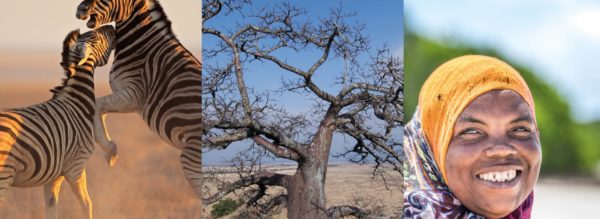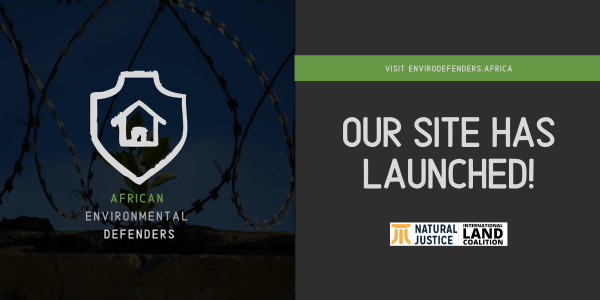African leaders and conservation organizations must fulfill their responsibility to take a stand and prioritize the protection of environmental human rights defenders, including those from Indigenous Peoples and local communities.
First published on 05/22/2024
By Aquilas Koko Ngomo and Milka Chepkorir
Policy and Advocacy Co-Coordinators for Africa, ICCA Consortium
Adopting the Global Biodiversity Framework was a historic step towards social and environmental justice. The framework includes provisions for protecting environmental human rights defenders, respecting human rights, recognizing the rights of Indigenous Peoples and local communities, and recognizing their roles in and contributions to nature conservation.
However, with great concern, we note that the violations of the universal and special rights of the Indigenous Peoples and local communities have continued throughout the last year and into 2024.
Practices by many states and non-government organizations (NGOs) in Africa have continuously had Indigenous Peoples and local communities paying for the price of conservation; this is unfortunate in a world where “fortress conservation” practices, which refer to excluding Indigenous Peoples and local communities from protected areas, are claimed to be a thing of the past.
We strongly condemn the ongoing violations of rights in the name of conservation and development in Africa. It is concerning to see a continued trend of rights violations and attacks on the defenders of universal human rights and rights of Indigenous Peoples and local communities resulting from the processes that should otherwise protect them.
We are concerned about the situation in many territories of life in Africa and those defending them. While the international community of nations discusses sustainable development, addressing climate change, conservation of biodiversity, and general conservation strategies, we are witnessing immense disregard for the rights of Indigenous Peoples and local communities related to lands and resources, which all these strategies target to protect. Yet, we remain hopeful and believe in the power of collective action and the willingness of African leaders and conservation organizations to make a positive change.
As we are writing this, threats, forced eviction, and killings of Indigenous Peoples and local communities have been happening in multiple countries in Africa, such as Kenya, the Democratic Republic of the Congo (DRC), Tanzania, and Cameroon. Furthermore, those who defend the rights of Indigenous Peoples and local communities are targeted, undergo threats, and are even assassinated. These violations have severe negative impacts on Indigenous Peoples and local communities and their lands and territories.
Indigenous Peoples’ and local communities’ rights to lands and resources and free, prior, and informed consent, among other rights, are infringed by business operators, armed groups, and governments to occupy their lands and worsen their living conditions, which are already bad enough.
Situations in Cameroon, DRC, Kenya and Tanzania
Recent situations of rights violations of the Maasai People from Loliondo in Tanzania, Ogiek People from Kenya, and the Batwa Pygmies displaced and murdered in Eastern DRC should be warning calls to strongly advocate for the respect of the rights of Indigenous Peoples and local communities in different instances, organizations, and institutions in the region.
Since October 2023, the Ogiek Indigenous Peoples of Kenya have been evicted from their ancestral territories in Narok County. The Ogiek are one of the hunter-gatherer Indigenous Peoples in Kenya. They live in and around the Mau Complex, their ancestral territory that has been and continues to be conserved and managed by past and current generations through their Indigenous knowledge systems.
Ensure a human rights-based approach, especially recognizing Indigenous Peoples’ collective rights to their territories during or before carbon projects come to these territories.
As a consequence of these forceful acts to remove the Ogiek from their land, many women, youth, children, and elderly Ogiek People have been exposed to many threats. Their territory has been exposed to more significant threats in the hands of those who do not have a connection to the land, like the Ogiek.
Reports indicate that these evictions are related to a carbon offsetting deal between the government of Kenya and a Dubai-based Carbon offsetting company.
Many carbon projects are starting across the world, this becomes the latest and most threatening precedent for the rights of Indigenous Peoples and local communities. We call on all institutions, from the global to the national and local levels, to ensure a human rights-based approach, especially recognizing Indigenous Peoples’ collective rights to their territories during or before carbon projects come to these territories.
In the Cherangany Hills of Kenya, Kenya Forest Service guards have been continuing threats, harassment, illegal and forceful evictions, and burning down homes and villages of Sengwer Indigenous People of Embobut from their ancestral territories. The attacks and evictions escalated in May 2024 with the burning of at least 600 houses in the Embobut forest. The Sengwer Council of Elders issued a press statement On 14th May 2024, calling on the government of Kenya and foreign donor agencies to halt the violent evictions.
In DRC alone, thousands of Indigenous peoples and local communities have been killed. Others were displaced from their living areas around Virunga National Park due to armed conflicts and attacks by the M23 and ADF armed groups operating in North Kivu and Ituri provinces to exploit natural resources and conquer Indigenous Peoples’ lands by terrorizing them and forcibly displacing them from their territories of life.
The victims remain in displacement camps and surrounding villages without assistance, even though the true assistance should be to ensure their rights are respected and they return to their lands and territories where their lives fit.
In Cameroon, an Indigenous rights defender was targeted, seriously injured, his home destroyed, and his wife raped for defending an Indigenous land this year. For security reasons, we are not publishing their names.
The protection of rights defenders should be a priority for African leaders
Together with the allied organizations working to support the custodian and guardian communities of the ICCAs—territories of life, the ICCA Consortium continues to advocate for protecting Indigenous Peoples’ and local communities’ rights. States and conservation NGOs must embrace the new global biodiversity framework as an essential tool to achieve that.
More than one year has passed since the Global Biodiversity Framework was adopted. This is the second International Day for Biological Diversity after the framework was adopted. We take this occasion to highlight once again our call that Indigenous Peoples and local communities’ rights violations must stop in the name of conservation or under any other excuse.
Furthermore, advocating for equal protection of all rights holders in Africa, including Indigenous Peoples and local communities on their lands and territories, should not be criminalized. The protection of rights defenders should be a priority for African leaders.
African leaders and conservation organizations are responsible for taking a stand and prioritizing the protection of environmental human rights defenders, including those from Indigenous Peoples and local communities.
We urge local, national, and international decision-makers and law enforcement authorities to pay attention to these issues and ensure strict respect for the rights of Indigenous Peoples and local communities. Abuse, threat, and killing of rights defenders in Africa must stop. Those defending individual and collective rights in different African countries, including the rights of Indigenous Peoples and local communities, deserve complete protection from authorities under national and international laws in force.



